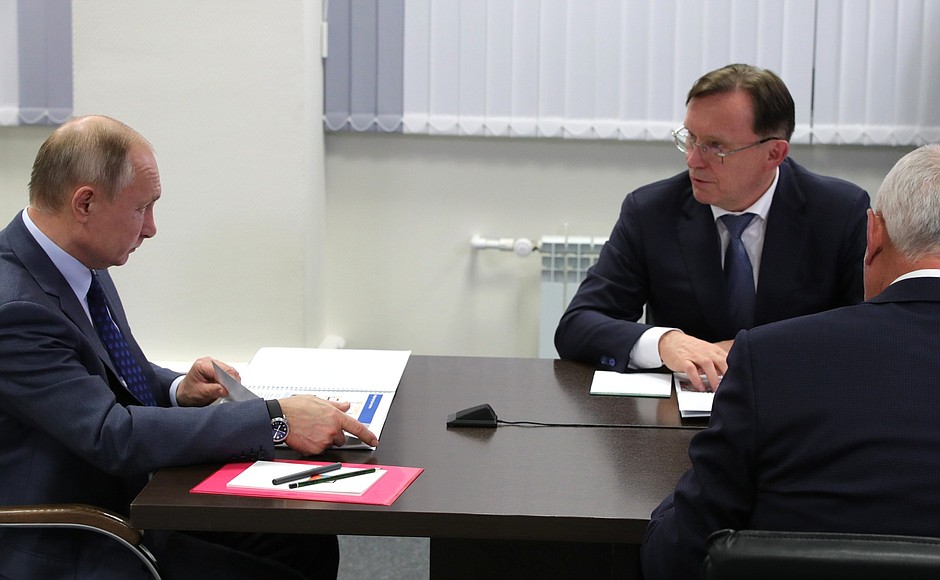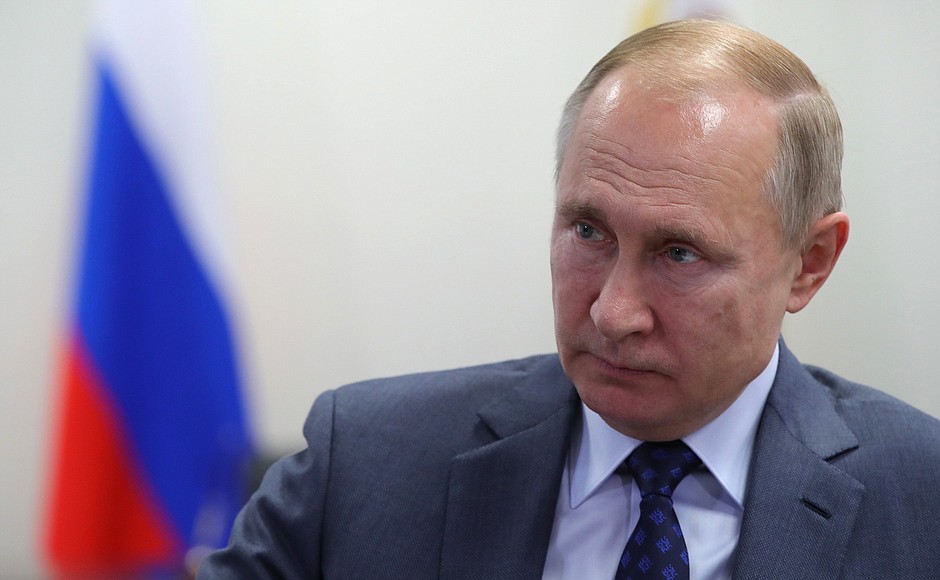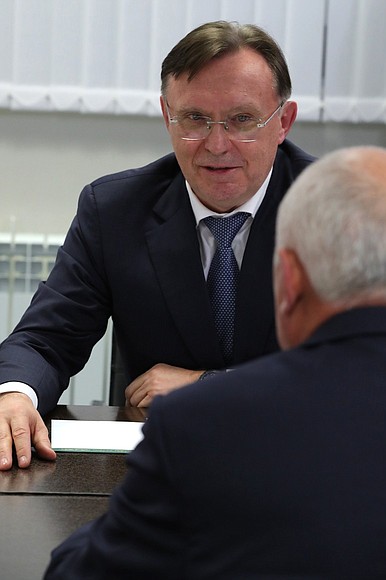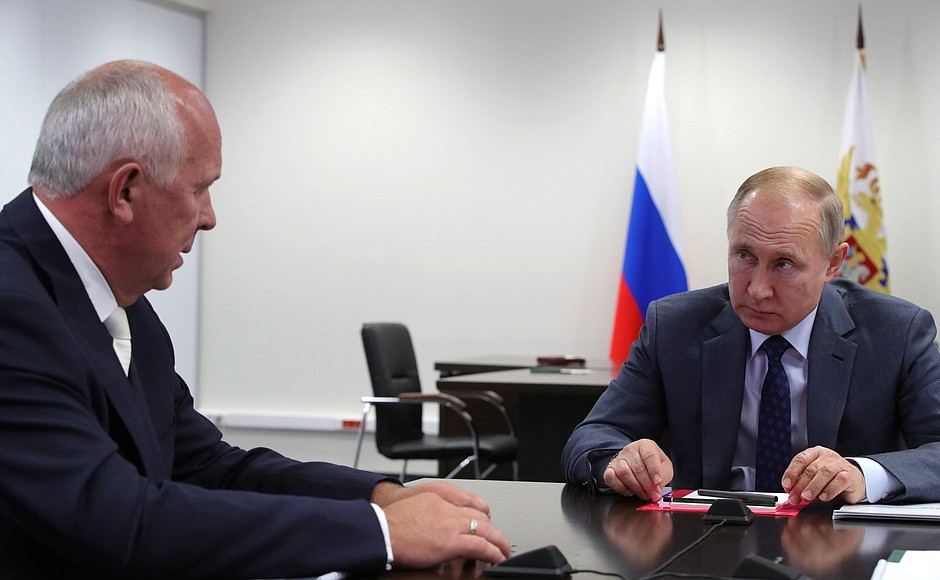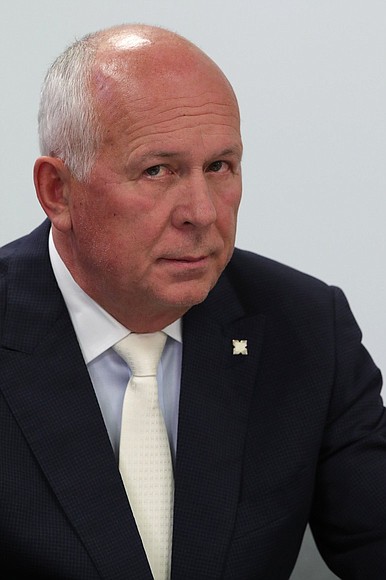President of Russia Vladimir Putin: Now in a quieter setting, I would like to congratulate you on the anniversary and thank you for your performance over the years.
I did not talk about this at the meeting with the workers, but I remember as well as you do what condition the plant was in in the late 1990s and early 2000s. We just talked about that. It was after the fire, of course, but it was not just because of fire. It was everything in general, the situation in the economy, and the fire certainly hit the factory hard. You took charge at a very difficult time; the company was struggling.
But what happened since then? It rose like a phoenix from the ashes and took a completely new shape, not only externally, but also in content, in quality. What we saw today is certainly impressive. I mean these autonomous vehicles, not just driverless, but vehicles that a person does not have to manage at all.
I understand that these are things of the future. But the K5 is not far into the future, is it? Apparently, this is what we will start with, right?
Sergei Kogogin: Yes, this is what we have today.
Vladimir Putin: Yes, please.
Sergei Kogogin: Mr President, first of all, I would like to thank you for coming to attend the 50th anniversary celebrations; this is a very significant event for our team. Every worker is aware of your schedule and therefore your visit and your congratulations to the team are very important.
Over the recent years, people have fully dedicated themselves to their work. This was characteristic of everyone, from me to the employees and from the employees to me. This is so because the amount of innovations and new developments that we have launched requires a lot of dedication. I must say that we have no indifferent people here, ours is a very healthy and ambitious team. And we are forging ahead.
I have prepared a brief presentation (basically, you have seen everything today) on the parameters we have set out. I will say what we have achieved. Currently, our consumers are using the first 20 vehicles. We are monitoring the results. The mileage has exceeded 100,000 kilometres; the important thing now is how the winter trials will fare. We are releasing another 20 vehicles in December, and we will start batch production in the first quarter of next year. The parameters that we have set out are just as good as some of the best models in the world.
Our partners were leading European, American and Chinese companies. We did it all together. But much of it has eventually enabled us to create a school. For example, in the area of diesel engine-making, we can assert with much certainty that our employees are able to develop any diesel engine; as for us, we have established a fine research infrastructure. Today, we have six stands. This is not much. I told you that an engine had worked for 30,000 hours while being tested at a stand. Currently, the amount of testing is even greater than before, because of calibration, fine-tuning, electronics performance, and the ecological pureness of exhausts, which is extremely time-consuming. But once we are through with it, it will last a long time. The schools have been established.
In addition to developing engines, since it has very good technical characteristics, there is also work with our domestic customers who have either already obtained this engine or require special adjustments. These include railway and agricultural equipment. Specifically, Rostselmash has already received several engines of this type for their tractors. Now they are installing and adjusting them so that they would be compatible with the tractors’ on-board computers. Then trials will begin. Our goal was to make sure the machine was ready for the farm work next spring. Peterburgsky Traktorny Zavod is carrying out similar operations right now on our engine but it was produced by the Tutayev Motor Plant that is part of KAMAZ. They are trying it out in both special-purpose vehicles and in shipbuilding. We are extending the application of our engines to maritime uses, thus creating an entire niche of operations.
As concerns the plants that you visited today, you saw the cabin, it is the most state-of-the-art production in the world.
Vladimir Putin: You can stand up in it.
Sergei Kogogin: Moreover, as I said, other plants have also been upgraded, to be able to produce these parts. It is a different level of precision and a different technology.
This project required modernising the assembly line. We have upgraded only one assembly line of the two. But one of the assembly lines will be compatible with the K3 generation while the latest generation, K5, will be assembled on a separate assembly line. We will continue producing K3 lorries. It is important to us, especially in the four-wheel-drive segment, where older vehicles will still be in use for another ten years.
We put a lot of effort into the infrastructure projects related to production engineering. We have an ERP system based on SAP. All processes are synchronised these days. A significant amount of work has been completed to arrange the logistics. Even here, at the plant we visited, one-third of the territory is used for logistics operations. It has Wi-Fi coverage; processes are digitalised and robots are involved everywhere. Robotic carts collect parts from the pallets in an automatic mode, stack up the shipment and move it out. All the workers and logistics specialists can use the terminals. In other words, everything is automated.
Future tasks. The sector is about to be transformed. We realise that electric cars and unmanned vehicles will inevitably arrive.
Vladimir Putin: There are also natural gas vehicles.
Sergei Kogogin: Yes, of course, this is inevitable.
Vladimir Putin: All the more so as you are also making them, aren’t you?
Sergei Kogogin: Yes, we are supervising this process. We have developed about 60 different models of natural gas vehicles. This year, we will sell 3,900 natural gas vehicles, an all-time high; this is 60 percent more than in 2018.
Second, regarding electric passenger transport. You have seen our electric bus, which is already mass-produced, and we are set to certify a trolleybus in the second half of 2020.
Vladimir Putin: Is this electric bus already operating in Moscow?
Sergei Kogogin: Yes, it is.
Moscow is also requesting this 18-metre long electric bus, and we will manufacture it by late 2020. Here is a nine-metre electric bus that carries people towards the main routes in areas with smaller passenger traffic.
Speaking of the next stage, we are already thinking what we will manufacture five years from now.
Vladimir Putin: Unmanned vehicles?
Rostec Director General Sergei Chemezov: We are already moving towards unmanned vehicles.
Sergei Kogogin: Lorries and trash collection vehicles.
It should be noted for justice’s sake that Gazprom has accomplished a lot. The current number of refueling stations already makes it possible to drive all over European Russia. We have conducted a survey, polled our consumers, and we have found out where refueling stations should be located. Alexei Miller has received this information. Their company, Gazprom Gas Motor Fuel, undertakes to build these refueling facilities on various routes in 2020–2021.
Vladimir Putin: Good, this is a capital-intensive project.
Sergei Kogogin: Yes, this is an extremely capital-intensive project. But this makes it possible to save a lot of fuel because gas now costs much less than diesel fuel; and fuel accounts for 40 percent of transport expenses. In effect, this is a very serious step.
We have conducted all the research, including the exact location of refueling stations.
As for education, we informed you before that we had proceeded from colleges to the interdepartmental training centre, which we did together with the republic’s authorities. It is part of the general education system, where our training centre is located so that no one starts working without completing the training cycle.
Vladimir Putin: Today workers asked about the system of higher education.
Sergei Kogogin: Unfortunately, I cannot settle the issue of higher education with the republic’s authorities. There is a good institute training vehicle engineers here; it is a branch of Kazan Federal University. However, the university lacks the funds for proper equipment and facilities. We also need to build dormitories, of course.
Vladimir Putin: Fine.
Sergei Kogogin: This university must have facilities that are no worse than those of Bauman University. Otherwise it will be very difficult to train good professionals here.
Sergei Chemezov: Maybe we should set up a branch of Bauman University here?
Vladimir Putin: Maybe, but Mr Kogogin says that we should support the existing federal university.
Sergei Kogogin: We finance the development of the material framework…
Vladimir Putin: Yes, the production facilities.
Sergei Chemezov: But Bauman University is a school.
Sergei Kogogin: Yes, it is a school.
Vladimir Putin: The costs will be lower. We need dormitories and a solid material framework.
Sergei Chemezov: The material framework is here.
Vladimir Putin: Yes, indeed it is.
Sergei Chemezov: We simply need to improve it, because, as I said, 84 percent of the graduates with good average marks leave the city.
Vladimir Putin: The republican university is good; it is a federal university. The other school is a research institute; it is a good school as well. In fact, it is very good, a high-quality institution. We will consider possible assistance.
Sergei Kogogin: Mr Chemezov and I will submit a letter regarding this.
Vladimir Putin: Good, agreed.
Sergei Kogogin: These are our current tasks.
Sergei Chemezov: I would like to say a few more words. Rostec, which is the main shareholder of Kamaz today, bought into it 10 years ago. Initially, the company was short of funds, and the situation was dramatic. But over the past five years, or even three years, we have invested considerable funds in it. We invested 54 billion rubles to create the facility you have seen today. But this is not enough. We must build the second stage of the engine plant and modernise the foundry and the axle plant. We need around 50 billion rubles more for this. We have invested as much as we could, some of it in a non-refundable form and another part in the form of loans. We may ask you for additional help.
Vladimir Putin: Will it be a staged investment?
Sergei Chemezov: Yes, of course.
Vladimir Putin: How much will you need a year?
Sergei Kogogin: We will need investment until 2023. The years 2020, 2021 and 2022 will be the most important period.
Vladimir Putin: So, three years then?
Sergei Chemezov: Yes, approximately three years.
Vladimir Putin: Some 12 billion rubles every year?
Sergei Chemezov: 13 billion.
Vladimir Putin: What is your stake in the company?
Sergei Chemezov: We hold a 47 percent stake. The republic owns 3 percent.
Vladimir Putin: In other words, the company is half state-owned.
Sergei Kogogin: Mr Chemezov, shall we say, has a special status.
<…>
